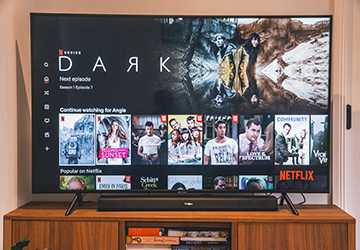When Is the Best Time to Buy a New TV?
Holiday Season: A Sea of Discounts and Bundles
The holiday season is more than just a traditional TV buying season; it's a shopping extravaganza that capitalizes on the collective mood of festivity and generosity. But it's not just widespread discounts that make this period tempting. Retailers often bundle TVs with sound systems, streaming devices, or even gift cards to entice buyers. These bundled offers can add significant value to your purchase, making the holiday season not just about discounts but about getting more for your money. Furthermore, holiday sales sometimes extend into January, providing a prolonged window for those who might have missed out on Black Friday or Cyber Monday.

New Releases: Tech Evolution Drives Bargains
New releases have a ripple effect on the market regarding new TV deals. As manufacturers introduce sets with updated technology, older models suddenly seem less appealing. But what is often overlooked is that the technology in last year's models is still relatively advanced. In many cases, these 'outdated' models offer 90% of the features of the new releases but at a fraction of the cost. So, while the limelight is on the latest models, savvy buyers can get highly advanced TVs at discounted prices, making the release season an underestimated best time to buy a TV.
Pre-Super Bowl Sales: A Surge in Large-Screen Buys
While it's well-known that TVs often go on sale before the Super Bowl, what's less discussed is the type of TVs that get the most significant cuts. The pre-Super Bowl period is like a goldmine of new TV deals if you're in the market for a large screen. Retailers know that Super Bowl parties are best enjoyed on big screens and price these models accordingly. It's not uncommon to find large-screen TVs at prices rivaling smaller models, making it an opportune time to upgrade your TV and your entire home theater experience.
Back-to-School and Tax-Free Weekends: An Unlikely Window of Opportunity
While back-to-school deals are primarily aimed at students and parents, they also present a little-known TV buying season for everyone else. TVs are becoming increasingly important in educational settings, from following online courses to researching academic material. Retailers, recognizing this trend, include TVs in their back-to-school sales. Furthermore, tax-free weekends can compound these discounts, leading to surprisingly low final price tags. So, while it may seem counterintuitive, the back-to-school season can offer rich pickings for TV buyers of all types.
Online Sales Events: The Growing Influence of E-commerce
With the surge in online shopping, events like Amazon Prime Day have become monumental in defining a TV buying season. But the opportunities are not restricted to Amazon alone. Online-only retailers like Newegg and even traditional stores with online platforms often host 'counter-sales' to compete. The competition among these platforms leads to a race to the bottom regarding prices, creating a buyer's market. These online events are becoming an increasingly significant period for finding the best time to buy a TV, with deals that often rival, if not beat, those found in physical stores.
Sporadic Sales and Inventory Clearouts: The Wild Cards
The unpredictability of flash sales, inventory clearouts, and refurbished or open-box deals add another layer of complexity to finding the best time to buy a TV. These are often unannounced and last for a limited time. It pays to be on various mailing lists and to have price alerts set up for the TV models you're eyeing.
End-of-Financial-Year Sales: A Hidden Gem in the TV Buying Season
One often overlooked period to consider when making a TV purchase is the end of the financial year. For many retailers, this period is a time to clear inventory and make room for newer models. Companies are also looking to bolster their sales figures before closing their books for the year. This results in an environment ripe for new TV deals. As a consumer, you can take advantage of this by watching for these sales, which typically happen between March and April, depending on the retailer and the region.

Manufacturer Rebates and Special Financing: An Often-Overlooked Factor
Special manufacturer rebates and financing options can make an otherwise ordinary time of year the best time to buy a TV. Sometimes, these rebates need to be prominently advertised and may require some digging on the manufacturer's website or even a call to customer service. Special financing can also make a higher-end model more affordable by spreading out the cost. These offers can pop up anytime but are often aligned with significant sales events or new product releases, offering another dimension to new TV deals.
Eco-Friendly or Trade-In Programs: A Win-Win Scenario
In an era when sustainability is gaining importance, several manufacturers and retailers offer trade-in programs. You can bring in your old television and receive a discount on a new one. This makes it environmentally responsible and provides another unique opportunity to find the best time to buy a TV. While these programs exist throughout the year, they are often promoted more heavily around Earth Day or other eco-focused events.
Extended Warranties and Added Perks: Small Incentives, Big Impacts
Sometimes, it's not just the upfront cost of the TV but also the extended value. Retailers occasionally offer extended warranties at no extra price or bundle additional services like free installation and wall mounting as part of special sales. While the monetary value of these added perks may not be enormous, they can tilt the balance when you're undecided.
Seasonal Content Boosts: Aligning Your Purchase with Viewing Preferences
If you are particularly fond of specific content, like summer sports or holiday movies, you might find targeted sales around these seasons. Channels and streaming services often release new content to coincide with these interests, and retailers quickly jump on the bandwagon with relevant new TV deals. This approach offers a nuanced way of identifying the best time to buy a TV.


